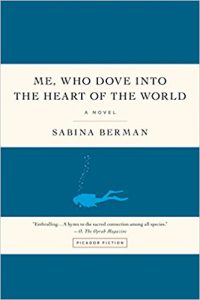Me, Who Dove into the Heart of the World, by Sabina Berman
Me, Who Dove into the Heart of the World
By Sabina Berman
Henry Holt
Five stars
Reviewed by Jessica Gribble
This remarkable novel (translated from Spanish) opened two worlds for me: the world of highly functioning autism and the world of humane tuna fishing. I would never have sought out either one. Fortunately, Me, Who Dove Into the Heart of the World isn’t a dry treatise on fishing or neural development disorders. Instead, like its title, it’s a poetic and beautifully written novel that engages with human emotions and humanity’s connectedness with nature.
The initially jarring title, which sounds so wrong, turns out to make perfect sense, because the main character identifies herself as “Me.” In fact, we meet her sitting on the beach, rocking back and forth, whispering “Me.” We learn that the girl’s aunt, upon being left a family tuna cannery, comes to inspect her property and finds a little girl, Karen—and teaches her a name, Me. The rest of the book tells the story of how the girl learns to talk, who she talks to—at first, only her aunt and a scarred fisherman named Captain Ricardo—and how she makes tuna fishing both more humane and more profitable.
Because Karen is autistic, she shows us the world in unusual ways. First, we notice that all of the numbers in the novel are expressed in numerals: “And then suddenly, 1 day, a girl, wearing socks and huaraches…” In school Karen learns Descartes’ famous axiom “I think, therefore I am.” She writes, in response, “That is definitively and obviously, idiotic. Anyone with 2 eyes in their head knows that any creature exists first and then does other things, like move its fins or breathe or spread pollen or think…” She doesn’t do well in that class; in fact, the only class in which she excels is technical drawing, though her teacher is cruelly dismissive of her drawing of a swallow trap that doesn’t trap the birds. In fact, the trap foreshadows her great invention, the first tuna habitat in which wild tuna are comfortable enough to breed.
Karen and her aunt struggle with the near-closure of the tuna cannery until multimillionaire Mr. Gould arrives to explain why their sale of stress-free, dolphin-safe tuna has failed. Relying on his money-making genius, they try his prescription: a different ocean, a different product, and a different market. Karen and her aunt agree to split the profits with Gould. Karen writes: “And that was how my aunt came to stake her future as well as mine and that of 800 fishery workers on the brilliant 10% of the brain of a woman who fell somewhere between imbecile and idiot and took on an all-or-nothing bet that would leads us to the little island of Nogocor in the African Mediterranean.”
Karen learns to sleep in hotels and how to be an international businesswoman, though most human interactions still make little sense to her. She receives a death threat from the Animal Rights Militia, an award for the best gastronomical product of the year, and a medal from the Committee for More Humane Animal Slaughter. But at the end of the book, Karen makes an executive decision that utterly changes the future of her company. She also escapes certain death.
Both the plot and the language of this book are totally enthralling. It’s one of those books that you have to disentangle from every time you set it down—it’s so easy to become part of Karen’s world, where ideas and relationships are 90 degrees different from the world most of us inhabit. It’s also a beautiful treatise on nature’s importance to humans of all kinds, even those justifiably called “Miss Different Abilities.”
